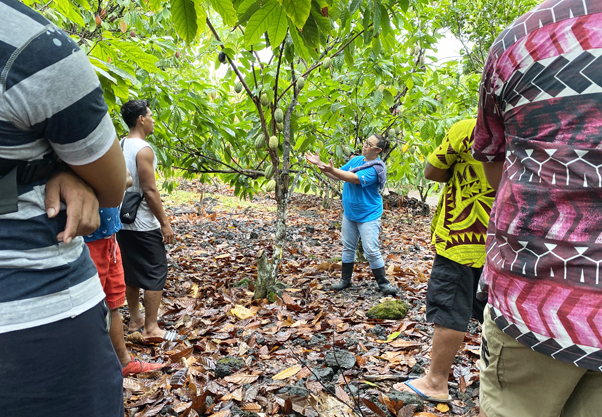Diversifying Samoa’s agriculture and fisheries sector is key to unlock the country’s green and blue economy potential, particularly through the creation of sustainable employment opportunities for women and youth during and after the COVID-19 pandemic.
That’s what a new project, funded by the Government of Japan through the 2020 Japanese Supplementary Budget (JSB) and implemented by the United Nations Development Programme (UNDP), aims to achieve.
The COVID-19 Preparedness and Recovery Diversification of the Economic Sector in Samoa (CPRDESS) Project aims to strengthen COVID-19 preparedness and accelerate socio-economic recovery through the revitalization, diversification and expansion of the agriculture and fisheries sector.
The project seeks to create a more sustainable, resilient and inclusive agriculture and fisheries sector, capable of buffering the risks, including socio-economic setbacks, in the face of future crises. It will identify niche market opportunities within the agriculture and fisheries sector, such as the expansion of taro ethanol production at scale, developing biodegradable and medical-grade face mask layers from crop waste and invasive species fibres to improve protection against airborne pathogenic organisms, strengthen the capacity for sustainable and sustained sea grapes or limu production, and expand the Youth Koko Innovation Initiative under the UNDP Youth Employment Programme Phase 2 (YEP-2), amongst many others.
“Japan has been taking various measures to prevent the further spread of the COVID-19 pandemic and to mitigate the socio-economic impacts on Pacific island countries and developing countries caused by the pandemic. As part of concerted international efforts, Japan is pleased to assist UNDP through this project in ensuring that opportunities such as creating sustainable employment amidst the present economic challenges are thoroughly implemented for the benefit of communities and the whole country. This project aligns with Japan’s Country Assistance Policy for Samoa which acknowledges that overcoming major challenges lies in achieving the sustainable development of the fisheries and agriculture sector. With our collaboration with UNDP, we can achieve more in promoting the economic empowerment of women and youth,” said HE Terasawa Genichi, Ambassador Extraordinary and Plenipotentiary of Japan to Samoa.
COVID-19 has presented Samoa with an opportunity to grow its narrow economic base, testing and strengthening social, economic and environmental resilience in safeguarding and accelerating progress against the 2030 Agenda for Sustainable Development and the Small Islands Developing States Accelerated Modalities of Action (SAMOA Pathway).

“Sustainable income-generating activities are what most people need urgently in light of the socio-economic effects brought about by COVID-19. This project represents our combined commitment with the Government of Japan to create jobs for the most vulnerable in our society – unemployed women and youth. At least 60 per cent of the targeted beneficiaries for this project are women and youth. We believe that the economic empowerment of women has a direct impact on gender equality, poverty eradication and inclusive economic growth,” said Jorn Sorensen, UNDP Resident Representative.
The project directly contributes to COVID-19 community prevention and preparedness, as well as the socio-economic response and recovery through immediate income relief and generation opportunities by means of the agriculture and fisheries sector efforts to “build back better” Samoa’s economy post-COVID. This is aimed at promoting high levels of decent and sustainable employment to protect livelihoods, particularly for women and youth.
The project will be implemented over 12 months, starting in April 2021 and will be done in partnership with the Scientific Research Organization of Samoa, the Ministry of Agriculture and Fisheries, the Ministry of Women, Community and Social Development, and the Samoa Chamber of Commerce and Industry.
